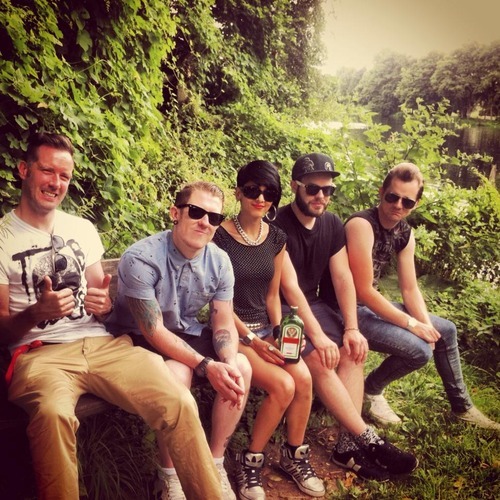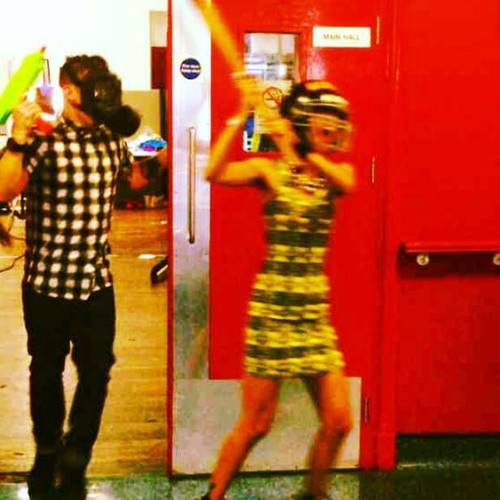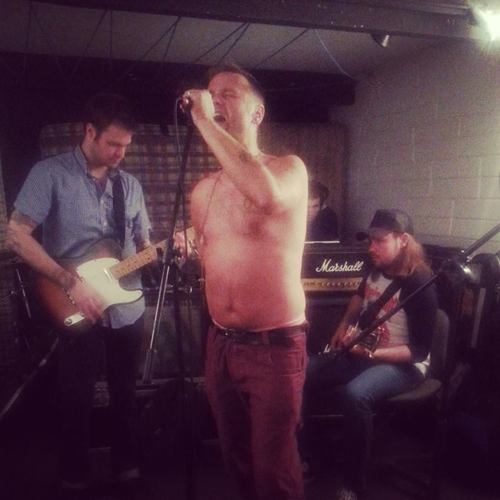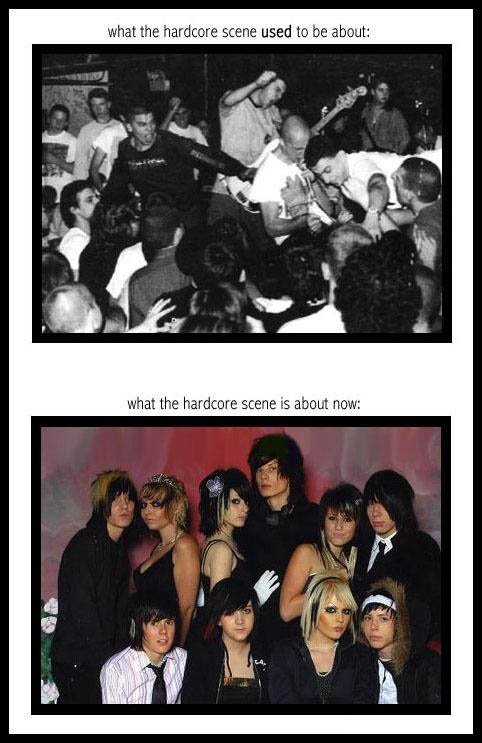In this special weekly guidance series we’re going to be exploring three key aspects of your band’s existence and encouraging you to consider these elements of your act with as much thought and deliberation as you write your songs. Simply expecting the inertia of creativity to steer your ship into the right direction is rarely enough; your band’s command of who you are, what you do and how you come across are all hugely important to consider. Across the series, Barney will use some real-world examples to illustrate how important these factors are and help you to apply these concepts to your own band.
READ PART 1: THINKING ABOUT… WHO YOU ARE HERE.
READ PART 2: THINKING ABOUT... WHAT YOU DO HERE.
LISTEN WITH YOUR EYES
You've identified the original and unique mix of styles with which your band is going to explode onto the musical landscape. You've found every last webzine to pursue, each blog writer to email and sussed out all the happening underground hotspots for your particular style. But what do you look like? And not just what do you look like but what does the band look like? Visually, what does your art evoke? A consistent aesthetic across all your output, from your clothing to your artwork to your interviews is ideal. Your average metalcore band's music is very different from that of an indie-folk act, and so it makes sense that their attire, promotional material and artwork looks different too. If it's representing you visually, it's worth thinking about how it defines and adds to your brand. And there it is, that dreaded marketing speak! But brand is something that all successful acts have a handle on, even if they do their hardest to pretend they've never even considered it. And there's nothing that gets some bands more defensive than talking about that dreaded little word... image.
 |
| The Specials, a band with a strong image, across all their content. |
Some bands balk at the very notion of discussing image. Some bands detest the idea of their appearance affecting their art. But a successful band without a decent image is very much the exception to the norm. By image I don't necessarily mean that you need to look ostentatious, showy or even fashionable. And while I understand the sentiment behind the cliché that 'people have paid to see you, so you should make some effort', that's really not always the case. A grunge band might look just great in ripped jeans and second-hand lumberjack shirts. But if three of the band members dress like that and the drummer dresses in sports gear, it's just not going to look right. By image I simply mean a consistent look across your band's appearance that relates to your music. There's no hard and fast rules to this and great band images vary wildly. The Police simply each bleached their hair blonde. Your image could even be that you all look completely different. As long as you've discussed your image and have decided what it is, you're on the right track. Certain members in any band are inevitably going to be more stylish than others, so if you're not one of those, consider swallowing your pride and let them help you dress. Franz Ferdinand and Blur were always bands where it looked somewhat like the singer dressed the drummer, but they were both bands whose image was a great part of their appeal. The really tricky part is making it look effortless. Bands like The Specials and The Ramones are some of the most credible bands around, but they also have two of the most iconic band images in history. It’s hard to imagine those groups of people discussing their wardrobe and haircuts. But the evidence that they must have is there, be it matching leather jackets or pork-pie hats, in every promo shot.
If image is something you're struggling with, it's worth thinking outside the box. In my band, image was something that we knew we had really lacked in our past attempts at being in bands. We decided that it was hopeless to try to dress the same because there was a range of styles within the band itself (a contrast of styles we actively drew upon in the music). Faced with the impossible task of streamlining our wardrobes, we decided to simply wear whatever we were comfortable in, but match the colours across our outfits. Red, Black and White was the, on reflection slightly unpleasant, combination I chose, but there it was, and we stretched the scheme onto our CDs, website and merch. We knew we were never going to set the world alight in the fashion stakes but we at least we had something that pulled us all together. Over the years, we’ve changed our colour schemes many times but we’ve always stuck to this strategy.
 |
The Ramones. Just happened to all dress exactly the same.
|
First and foremost, think about your band photographs. Once you've nailed a consistent look across the band in terms of your clothing, all the style and philosophy of your music may also be expressed elsewhere in these images. While it's an extreme cliché to have an old-school rapper stood in front of graffiti on an urban wall, it's a fairly clear example of this concept. Just as we discussed how important it is that your music represent where you're from in PART 1 of this series, the setting of your photographs can relate this too. Record artwork is another great way to express the character of your band and the ideal place to start in terms of brainstorming approaches to capture the aesthetic of your music in a visual form. Perhaps nailing the right artwork for your band is the jumping-off point you need to then go back and re-assess how you present yourself in terms of image? You can continue this through to your logo design and the way that you present your website. If you're a cool, quirky, tropical indie band, your logo and web presence should look completely different from that of a dark dubstep act. After all, the emotions that your respective music styles evoke when people listen to them are completely different. The key is to consider the characteristics of your music that are evocative and choose imagery that reflects those characteristics.
 |
| Aphex Twin's imagery is cold, unsettling and complex, just like his music, and supports his music across all his platforms. |
How a band looks can even go beyond the visual. Any text related to a band is a great opportunity to push the band's brand and express your philosophy, image and style. If you're a hip-hop act whose lyrics are deep, complex and intellectual, then any text related to your music should have the same attention to detail and character as your lyrics. Use your biographies, social media and blog output to express your character and write with the same tone as the list of adjectives that describe your music. I wrote a blog for our friends at the Unsigned Guide called the Top 5 Mistakes That Bands Make on Their Biogs that highlights the perils of going too far with this approach, but as long as you remain aware of the purpose that your writing is for, having some fun with the style of its delivery is a great sizzle on your steak.
Another tremendous opportunity to put across your philosophy, image and style, are interviews. With the amount of internet blogs being written about bands right now, it's inevitable that you'll be asked to do one sooner or later. Remember, just like when you are writing your biography, an interview is a chance for you to put across your band in words and not a dull exercise where you literally answer the questions. If the questions are bad, nix them and answer the interviewer with what you want to say about the band. Steer the questions towards what you want to express that is interesting about your band. I recommend that bands "use the biography to highlight the music’s truth, not relay the literal truth" and I feel the same about interviews. Finally, it doesn't hurt to have stock answers to a range of questions that you, as a band, sit and hash out to keep the whole band 'on message'. As well as meaning that there is a consistency in your story that way, it provides a great opportunity for you as a band to touch base about your philosophy, bounce around ideas about your art, and refresh your memories and vision of where you're at and where you're heading.
THANKS AND GOODBYE FOR NOWI hope you've enjoyed this series as much as I've enjoyed writing it and the ideas presented have enhanced your grasp of who you are, what you do and how you look. To re-iterate my point from the introduction, "these blogs will be most beneficial if used as a jump-off point for discussion between you and your band members. The whole idea is that you, as an emerging band, get on the same page about who you are, what you do and how you look. If you have a unified vision, it's half the battle. Organise a band meeting, hash these things out and I guarantee you'll be making a positive and productive step for your band."
This is my last guidance blog for Songeist. If you've enjoyed my advice and writing, please keep up with my band HERE, my blog HERE and follow me on Twitter HERE. Thank you to everyone that's read, commented and shared these blogs and thanks to Songeist for the opportunity to write them.











